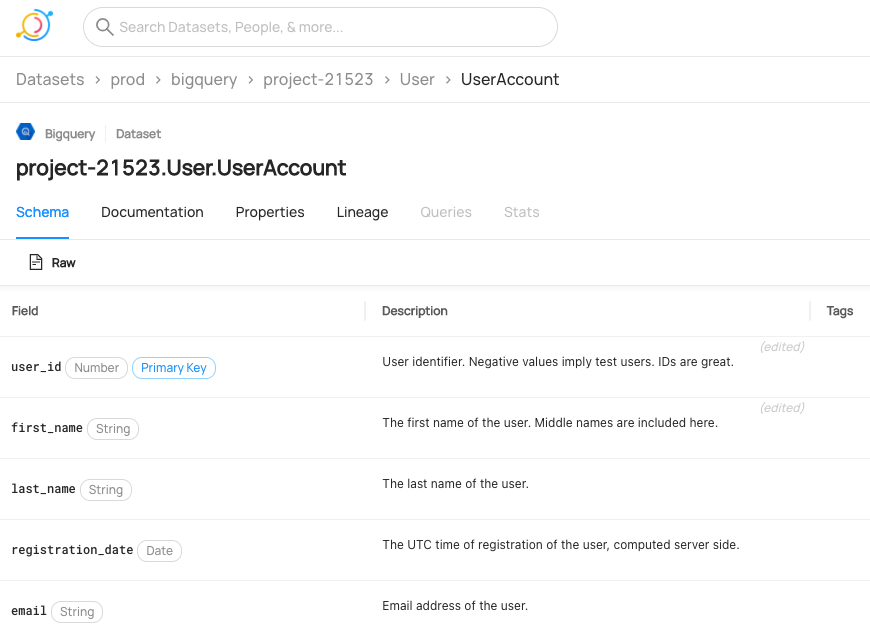DataHub: The Data Discovery Platform for the Modern Data Stack
Built with ❤️ by  Acryl Data and
Acryl Data and  LinkedIn
LinkedIn
🏠 Hosted DataHub Docs (Courtesy of Acryl Data): datahubproject.io
Quickstart | Features | Roadmap | Adoption | Demo | Town Hall
📣 DataHub Town Hall is the 4th Thursday at 9am US PT of every month - add it to your calendar!
- Town-hall Zoom link: zoom.datahubproject.io
- Meeting details & past recordings
✨ DataHub Community Highlights:
- Read our Monthly Project Updates here.
- Bringing The Power Of The DataHub Real-Time Metadata Graph To Everyone At Acryl Data: Data Engineering Podcast
- Check out our most-read blog post, DataHub: Popular Metadata Architectures Explained @ LinkedIn Engineering Blog.
- Join us on Slack! Ask questions and keep up with the latest announcements.
Introduction
DataHub is an open-source data catalog for the modern data stack. Read about the architectures of different metadata systems and why DataHub excels here. Also read our LinkedIn Engineering blog post, check out our Strata presentation and watch our Crunch Conference Talk. You should also visit DataHub Architecture to get a better understanding of how DataHub is implemented.
Features & Roadmap
Check out DataHub's Features & Roadmap.
Demo and Screenshots
There's a hosted demo environment courtesy of Acryl Data where you can explore DataHub without installing it locally
Quickstart
Please follow the DataHub Quickstart Guide to get a copy of DataHub up & running locally using Docker. As the guide assumes some basic knowledge of Docker, we'd recommend you to go through the "Hello World" example of A Docker Tutorial for Beginners if Docker is completely foreign to you.
Development
If you're looking to build & modify datahub please take a look at our Development Guide.
Source Code and Repositories
- datahub-project/datahub: This repository contains the complete source code for DataHub's metadata model, metadata services, integration connectors and the web application.
- acryldata/datahub-actions: DataHub Actions is a framework for responding to changes to your DataHub Metadata Graph in real time.
- acryldata/datahub-helm: Repository of helm charts for deploying DataHub on a Kubernetes cluster
- acryldata/meta-world: A repository to store recipes, custom sources, transformations and other things to make your DataHub experience magical
- dbt-impact-action : This repository contains a github action for commenting on your PRs with a summary of the impact of changes within a dbt project
- datahub-tools : Additional python tools to interact with the DataHub GraphQL endpoints, built by Notion
- business-glossary-sync-action : This repository contains a github action that opens PRs to update your business glossary yaml file.
Releases
See Releases page for more details. We follow the SemVer Specification when versioning the releases and adopt the Keep a Changelog convention for the changelog format.
Contributing
We welcome contributions from the community. Please refer to our Contributing Guidelines for more details. We also have a contrib directory for incubating experimental features.
Community
Join our Slack workspace for discussions and important announcements. You can also find out more about our upcoming town hall meetings and view past recordings.
Adoption
Here are the companies that have officially adopted DataHub. Please feel free to add yours to the list if we missed it.
- ABLY
- Adevinta
- Banksalad
- Cabify
- ClassDojo
- Coursera
- CVS Health
- DefinedCrowd
- DFDS
- Digital Turbine
- Expedia Group
- Experius
- Geotab
- Grofers
- Haibo Technology
- hipages
- inovex
- IOMED
- Klarna
- Moloco
- N26
- Optum
- Peloton
- PITS Global Data Recovery Services
- Razer
- Rippling
- Showroomprive
- SpotHero
- Stash
- Shanghai HuaRui Bank
- s7 Airlines
- ThoughtWorks
- TypeForm
- Udemy
- Uphold
- Viasat
- Wikimedia
- Wolt
- Zynga
Select Articles & Talks
- DataHub Blog
- DataHub YouTube Channel
- Optum: Data Mesh via DataHub
- Saxo Bank: Enabling Data Discovery in Data Mesh
- Bringing The Power Of The DataHub Real-Time Metadata Graph To Everyone At Acryl Data
- DataHub: Popular Metadata Architectures Explained
- Driving DataOps Culture with LinkedIn DataHub @ DataOps Unleashed 2021
- The evolution of metadata: LinkedIn’s story @ Strata Data Conference 2019
- Journey of metadata at LinkedIn @ Crunch Data Conference 2019
- DataHub Journey with Expedia Group
- Data Discoverability at SpotHero
- Data Catalogue — Knowing your data
- DataHub: A Generalized Metadata Search & Discovery Tool
- Open sourcing DataHub: LinkedIn’s metadata search and discovery platform
- Emerging Architectures for Modern Data Infrastructure
See the full list here.
Security Notes
Multi-Component
The DataHub project uses a wide range of code which is responsible for build automation, documentation generation, and include both service (i.e. GMS) and client (i.e. ingestion) components. When evaluating security vulnerabilities in upstream dependencies, it is important to consider which component and how it is used in the project. For example, an upstream javascript library may include a Denial of Service (DoS) vulnerability however when used for generating documentation it does not affect the running of DataHub itself and cannot be used to impact DataHub's service. Similarly, python dependencies for ingestion are part of the DataHub client and are not exposed as a service.
Known False Positives
DataHub's ingestion client does not include credentials in the code repository, python package, or Docker images. Upstream python dependencies may include files that look like credentials and are often misinterpreted as credentials by automated scanners.










